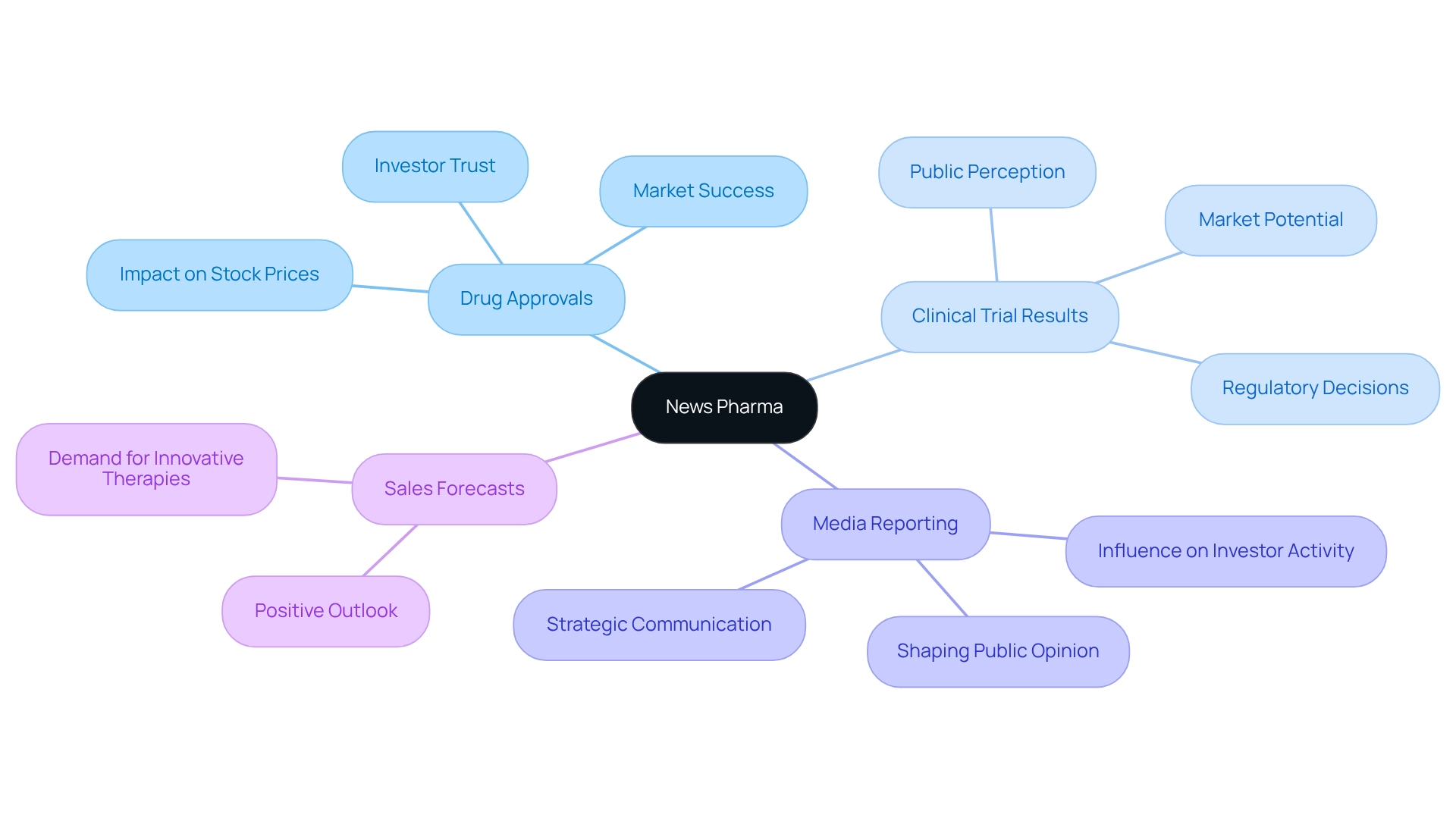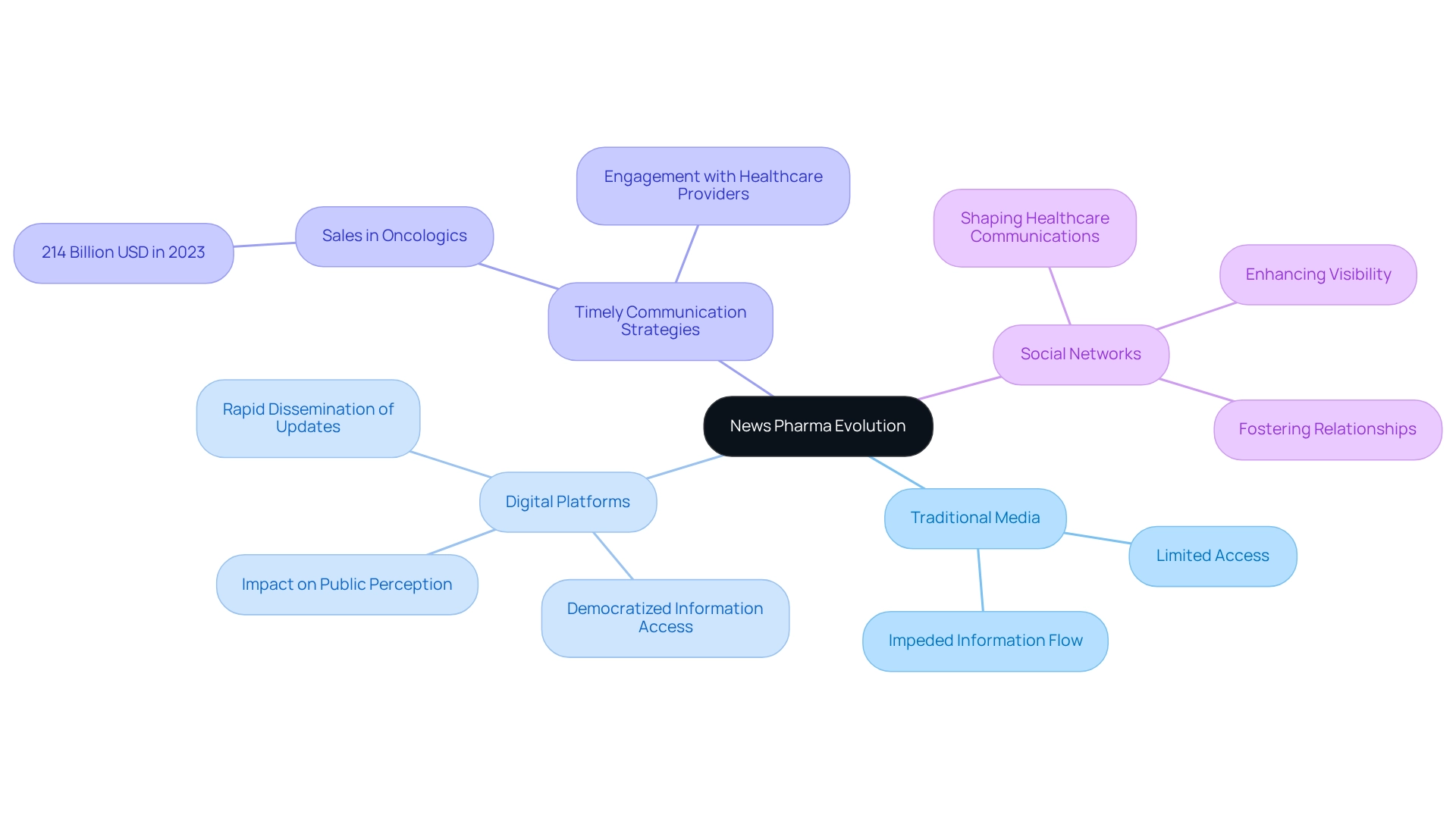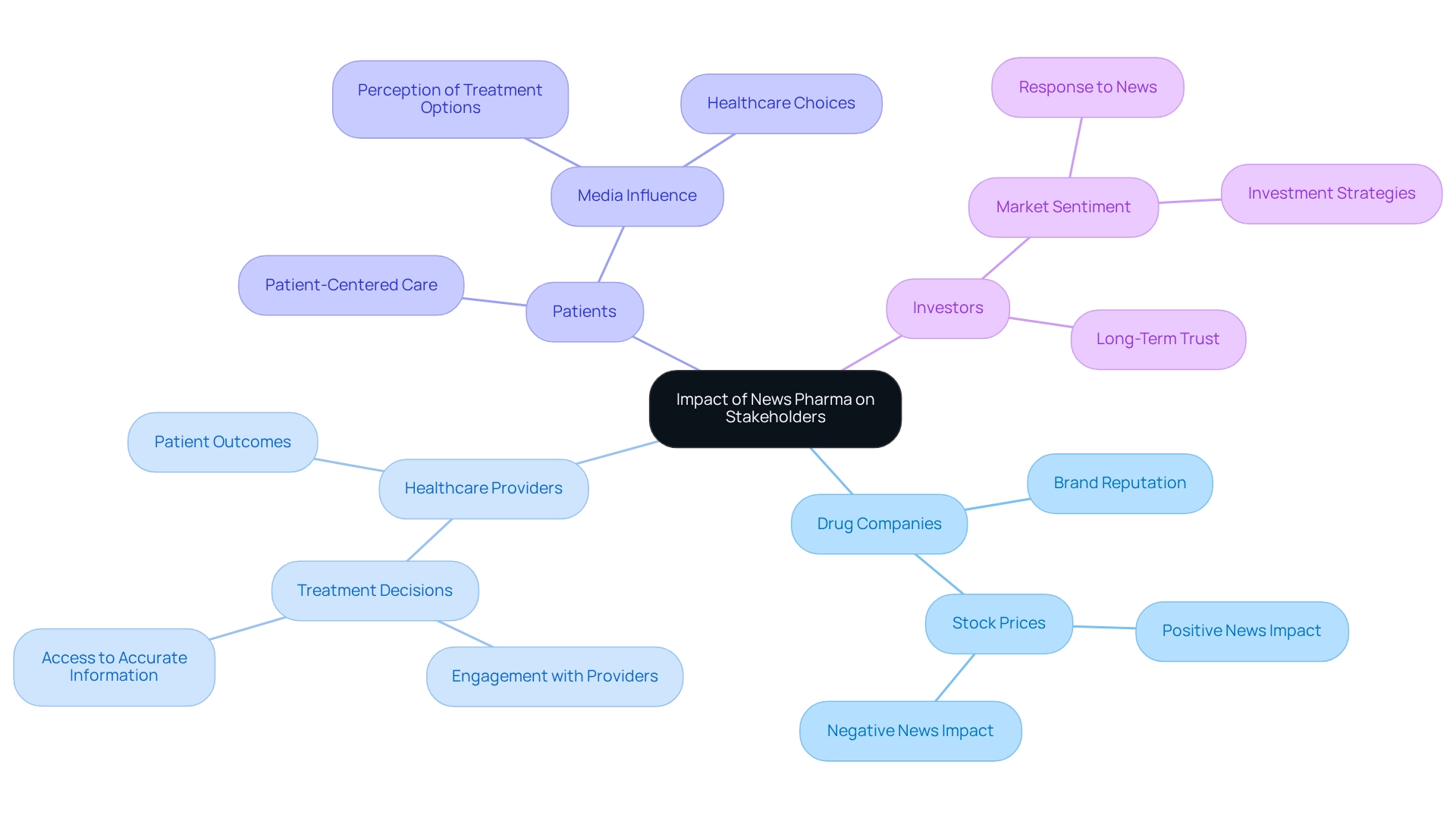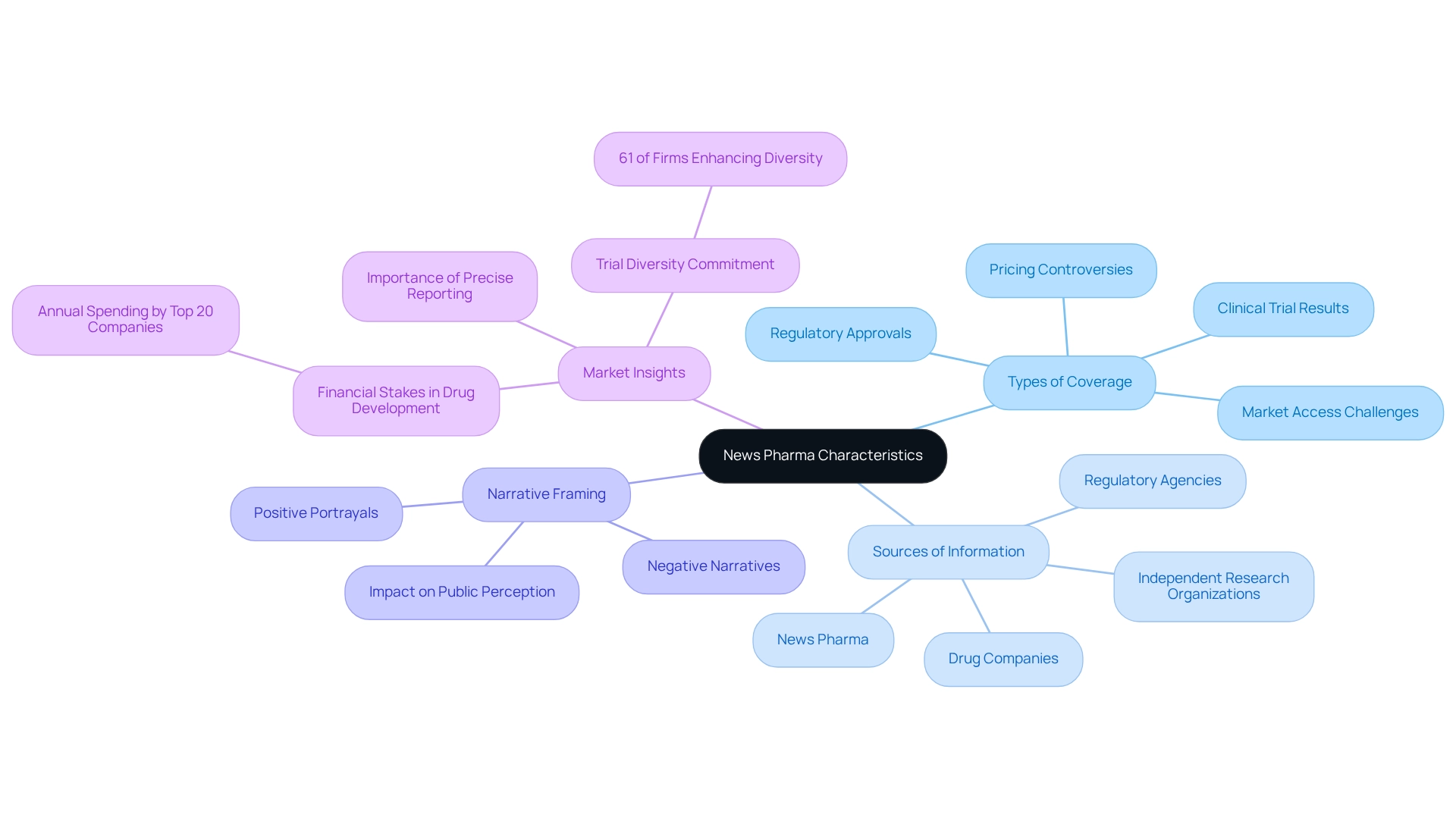Overview
The article titled “Understanding News Pharma: Key Concepts and Industry Impact” delves into the critical interplay between advancements in the pharmaceutical industry and media reporting. It highlights how news narratives significantly influence public perception, investor behavior, and regulatory scrutiny. By illustrating the effects of drug approvals and clinical trial results on stock prices and market dynamics, the article emphasizes the necessity for pharmaceutical stakeholders to engage proactively with the media. This engagement is essential for effectively navigating the complexities of the healthcare landscape.
Introduction
In the ever-evolving landscape of the pharmaceutical industry, the intersection of news and media has emerged as a powerful force shaping perceptions, investment decisions, and regulatory scrutiny.
As stakeholders navigate this complex terrain, understanding the nuances of News Pharma becomes crucial. The impact of clinical trial results on stock prices and the role of media narratives in influencing patient choices illustrate the far-reaching dynamics of pharmaceutical news.
With the digital age transforming how information is disseminated, pharmaceutical companies must adapt their communication strategies to maintain relevance and foster trust.
This article delves into the key concepts, evolution, and implications of News Pharma, highlighting its significance for companies, healthcare providers, patients, and investors alike.
Define News Pharma: Key Concepts and Terminology
News Pharma highlights the crucial convergence of advancements in the drug industry and media reporting, emphasizing how information shapes public viewpoint, investor activity, and regulatory examination. Key concepts within this field include drug approvals, clinical trial results, and access news, all of which play a pivotal role in influencing stock prices and overall economic dynamics.
Understanding these terms is essential for stakeholders in the pharmaceutical sector. Drug approvals represent critical milestones that can greatly influence a company’s competitive standing and investor trust. Clinical trial results not only inform regulatory decisions but also shape public perception; positive outcomes can enhance a drug’s reputation and significantly increase its market potential.
Recent statistics reveal that public opinion on news pharma is progressively shaped by drug-related news narratives, impacting investor feelings and influencing stock values. For instance, positive press attention regarding a successful clinical trial can lead to a rise in stock value, while unfavorable reports can produce the contrary effect. Notably, sales forecasts for the pharmaceutical industry indicate a positive outlook, with expectations of reaching two trillion dollars in revenue within the next five years, reflecting the ongoing demand for innovative therapies and medications.
Case studies demonstrate the significant influence of media reporting on drug approvals. A recent analysis revealed that drugs receiving extensive media attention during their approval process experienced a higher likelihood of market success compared to those that did not. This underscores the importance of strategic communication in the drug industry. As research expert Matej Mikulic notes, “This text provides general information. Statista assumes no liability for the information provided being complete or accurate,” emphasizing the necessity of understanding drug approval updates and their implications.
Moreover, integrating CareSet’s comprehensive healthcare data insights can empower stakeholders in navigating these complexities. By leveraging data-informed insights, pharmaceutical firms can enhance their access strategies and respond effectively to communication narratives. Expert opinions emphasize the necessity of understanding news pharma and its implications. Industry leaders assert that remaining aware of clinical trial outcomes and news pharma is essential for successful market access strategies. By grasping these essential concepts and their interrelations, stakeholders can more effectively navigate the intricacies of the healthcare landscape, making informed choices that improve patient care and promote business success.

Contextualize News Pharma: Evolution and Relevance in the Industry
The concept of news pharma has undergone a substantial transformation in recent decades, primarily driven by the rise of digital platforms and social networks. Traditionally, medical updates were disseminated through conventional channels, limiting access and impeding the flow of information. In contrast, the emergence of online platforms has democratized information access, enabling rapid dissemination of updates that significantly influence public perception and investor sentiment.
This evolution necessitates that pharmaceutical companies adopt a more proactive stance in managing their media presence. With the velocity of information flow accelerating, companies must be equipped to respond promptly to news coverage and engage effectively with stakeholders. For instance, sales in oncologics reached $214 billion in 2023, underscoring the growing importance of cancer therapies and the urgent need for timely communication strategies in this competitive landscape. CareSet’s comprehensive Medicare data solutions are crucial for effective market access and patient engagement strategies, providing the data-driven insights essential for navigating this environment and empowering drug and biotech firms to enhance their lifecycle management.
Moreover, industry experts have noted that social networks play a pivotal role in shaping healthcare communications. Organizations that adapt to these digital trends can enhance their visibility and foster stronger relationships with their audiences. The case study titled “Putting Patients First: Unlocking Medicare Data to Empower HCP” exemplifies how timely engagement with healthcare providers about treatment options, such as the 4th line of therapy for gastrointestinal stromal tumors, is vital. This highlights the necessity for proactive communication strategies in oncology. As Ketaki Joshi aptly articulates, the drug industry discovers, evolves, manufactures, and markets medications intended for patient care, whether for treatment or vaccination. As the news pharma landscape continues to evolve, integrating digital media strategies will be indispensable for companies striving to maintain relevance and foster engagement in an increasingly intricate environment. Furthermore, the significant role of the US drug industry in the economy, characterized by its employment and innovation levels, further accentuates the importance of effective communication within this sector.

Analyze the Impact of News Pharma on Stakeholders in the Pharmaceutical Sector
Pharma exerts a profound influence on a diverse array of stakeholders, including drug companies, healthcare providers, patients, and investors. For pharmaceutical companies, positive news pharma coverage can significantly enhance their brand reputation and lead to an uptick in stock prices. Conversely, unfavorable information can trigger public backlash and invite regulatory scrutiny, impacting both market perception and financial performance. Healthcare providers rely on precise information to guide their treatment decisions, as they must navigate the complexities of drug efficacy and safety amidst a sea of data. This is particularly crucial in oncology, where timely engagement with healthcare providers regarding treatment options, such as the 4th line of therapy for Gastrointestinal Stromal Tumor (GIST), can significantly influence patient outcomes and provider decisions.
In the case study “Putting Patients First: Unlocking Medicare Data to Empower HCP,” CareSet demonstrates how leveraging Medicare data can enhance provider engagement and improve treatment pathways. By delivering high-quality insights, CareSet empowers healthcare providers to make informed decisions about treatment options, ultimately benefiting patient care.
Patients, too, are increasingly swayed by media narratives, which shape their perceptions of treatment options and influence their healthcare choices. Investors are especially sensitive to information trends, as they act as indicators of sentiment in the economy. Stock prices frequently vary in reaction to news pharma, with studies indicating that favorable disclosures can lead to significant rises in share value, while adverse reports can cause steep drops. For instance, a case study revealed that a favorable clinical trial result led to a 15% rise in a company’s stock price within days, underscoring the direct correlation between news and market performance. This highlights the importance of accurate insights, similar to CareSet’s commitment to delivering high-quality Medicare insights in the realm of news pharma, which ensures that healthcare providers have the information necessary to make informed treatment decisions.
Additionally, the influence of narratives in the press goes beyond short-term financial consequences; it also impacts lasting brand reputation. Firms that succeed in fostering a favorable media image frequently benefit from ongoing investor trust and customer allegiance. Conversely, unfavorable press attention can cause enduring harm, as demonstrated in cases where public reaction to a drug’s side effects led to falling stock prices and reduced confidence in the brand. As Charles Darwin noted, “It is not the strongest of the species that survives, nor the most intelligent, but the one most responsive to change.” This emphasizes the need for drug companies to adjust to media stories to preserve their market standing.
In summary, the interaction between information and stakeholder behavior is critical in the news pharma landscape, influencing everything from treatment decisions to investment strategies. As the industry continues to evolve, the significance of precise and prompt information cannot be overstated, emphasizing the need for stakeholders to stay alert and adaptable to the constantly shifting media landscape, especially regarding Medicare data and treatment pathways.

Examine Characteristics of News Pharma: Components and Variations
Key characteristics of news pharma encompass various types of news coverage, sources of information, and narrative framing. In news pharma, coverage typically includes:
- Clinical trial results
- Regulatory approvals
- Market access challenges
- Pricing controversies
Sources of information are varied, often including:
- Drug companies
- Regulatory agencies
- Independent research organizations
- News pharma
The framing of news pharma plays a crucial role in shaping public perception; for example, positive portrayals of new drugs can enhance acceptance, while negative narratives may foster skepticism. Significantly, almost 13.5% of individuals are prescribed five or more medications, highlighting the importance of precise reporting in the medicine sector. Furthermore, a case study on quoting practices revealed that reliance on quotes from study authors without external verification can lead to public misconceptions about scientific findings, emphasizing the need for diverse sources in media reporting.
As the typical yearly expenditure on drug development by the leading 20 drug companies approaches around $60 billion, the financial stakes involved in precise reporting become clear. Furthermore, with 61% of surveyed companies dedicating themselves to increasing trial diversity, it is evident that enhancing representation in clinical trials is an important element of news pharma. CareSet’s monthly Medicare updates enhance provider engagement by delivering novel insights into drug utilization and treatment pathways, mapping the patient journey from diagnosis to treatment. These updates address critical business questions such as:
- Which diseases providers diagnose and treat
- How patients navigate their treatment journey
- What treatments are being approved by Medicare Part D Plans
CareSet identifies 15% more targets and 250% more patients than leading claims vendors, demonstrating its significant impact on pharmaceutical strategies. Understanding these components is vital for stakeholders aiming to navigate the media landscape effectively and influence public discourse positively.

Conclusion
The evolution of News Pharma highlights its essential role in shaping the pharmaceutical landscape. As the industry navigates rapid digital transformation, the influence of media narratives on public perception, investor behavior, and regulatory scrutiny has reached unprecedented levels. Stakeholders must grasp key concepts such as drug approvals, clinical trial results, and the dynamics of media coverage to effectively traverse this complex terrain.
Pharmaceutical companies are encouraged to implement proactive communication strategies, especially as social media continues to redefine information dissemination. Engaging with healthcare providers and patients through timely and accurate news not only enhances treatment decisions but also builds trust and loyalty. Furthermore, the financial ramifications of media narratives underscore the necessity for companies to remain vigilant and responsive to public sentiment; positive coverage can lead to significant stock value increases, while negative news can have dire consequences.
Ultimately, the intersection of news and the pharmaceutical industry serves as a crucial reminder of the significance of strategic communication. By leveraging data-driven insights and comprehending the nuances of media influence, stakeholders can better position themselves to improve patient care, drive business success, and navigate the evolving landscape of pharmaceutical news. An ongoing commitment to transparency and proactive engagement will be vital for companies striving to maintain relevance and cultivate trust in an increasingly intricate and competitive environment.


